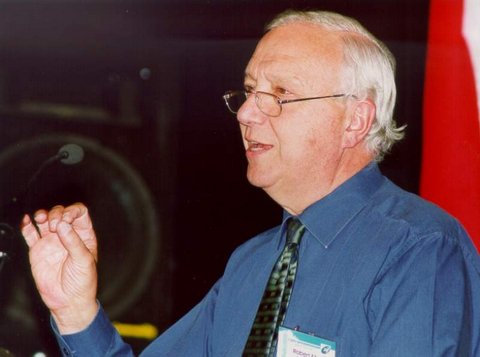By Sally-Ann Wilson, CEO Public Media Alliance
From the first tentative days of wireless, radio has expanded into a universal means of communication. It leaps around the world on short waves linking capitals in a fraction of a second. It jumps to high satellites to put its footprint across a continent and it streams through the Internet to reach every digital device around the globe. It brings that world to those who cannot read and helps maintain a contact for those who cannot see.

In this opening paragraph to his book, Radio Production, author Robert McLeish captures the essence of radio. After the written word, radio remains one of the most efficient and effective means of mass communication. Each day at the Public Media Alliance we witness the importance of radio to broadcasters and audiences around the world.
We rarely promote books via our website but to mark World Radio Day we interviewed a radio ‘Master’; broadcaster and author Robert McLeish. Recently Robert worked with fellow radio professional Jeff Links to write and update a new edition of Radio Production. First published in 1978, this is the 6th edition of the ultimate guide to radio. Twenty six chapters and 418 pages cover everything you need to know about radio, as a student or professional.
“It was communication that led to democracy-it meant the ordinary person could call power to account. It was there for everyone, whether or not you could read”
Robert had a 33 year career in radio with the BBC but he told me that it was during his National Service, spent with the Royal Signals Regiment, that he became ‘fired up’ with the idea of radio. “It was communication that led to democracy-it meant the ordinary person could call power to account. It was there for everyone, whether or not you could read”.
We agreed that little has changed in terms of radio being central to public media. Robert remains passionate about the power and potential of radio, “It has real capacity to introduce new ideas and that means it has the power to change”. It isn’t, he reiterates, a directive medium – you can leave it to the listener to make their own decision.

Radio doesn’t limit what you can ‘see’ with the size of a screen. Radio’s pictures are any size you, the listener, cares to make them. We chatted about what makes radio unique. Apart from his time with the BBC Robert has worked in radio around the world from the Solomon Islands to Russia, Australia to India. He has trained many, many radio professionals, both in person and via the book Radio Production.
We came to the conclusion that radio is just so personal. Radio happens inside of your head, “It’s not a public address system. The broadcaster gets ever closer to the listener-something which the use of social media helps to reinforce. It makes programming more personal-getting alongside your listener, generating companionship, support and loyalty”. The personal nature of radio was emphasised here in the UK recently with the death of veteran Irish radio broadcaster Terry Wogan. Wogan always insisted that he spoke to one listener not many….he ended his last broadcast with the words, “Thank you for being my friend”.
Fully updated, the book notes how the web has transformed radio to make it ever more accessible. But while it remains ‘up close and personal’, radio has now increased its reach. It is also becoming cheaper and more accessible and this means that radio stations can work not just in regional languages but in making programmes for specific dialects; as Robert explained it enables the rediscovery of our oral traditions, wherever we live in the world.
Radio also has transnational power, allowing those living away from home in the diaspora to connect with ‘home’ on a daily basis whatever their schedule or time zone.
Radio Production covers every aspect of radio; the studio, recording, ethics, news, vox pops, phone-ins, cues and links, drama, music, sequence programmes, commercials, outside broadcasting, evaluating, training and, perhaps most importantly, the ‘voice’.
In a new media age radio often gets overlooked, it seems ordinary and unspecial. Then we get a new radio sensation such as the podcast ‘Serial’. Radio is at its most vivid when it is live and immediate. But, enhanced rather than stifled, by digital technologies radio will doubtless continue to expand into new and unexpected areas.
Radio Production over the years
For more information about the 6th edition of Radio Production, email info@publicmediaalliance.org